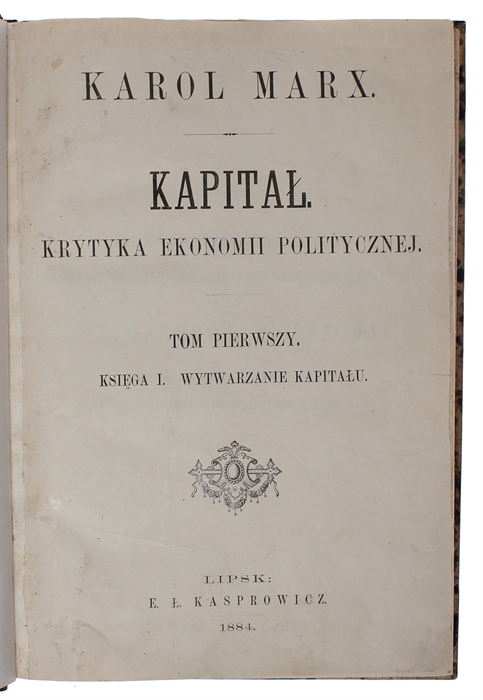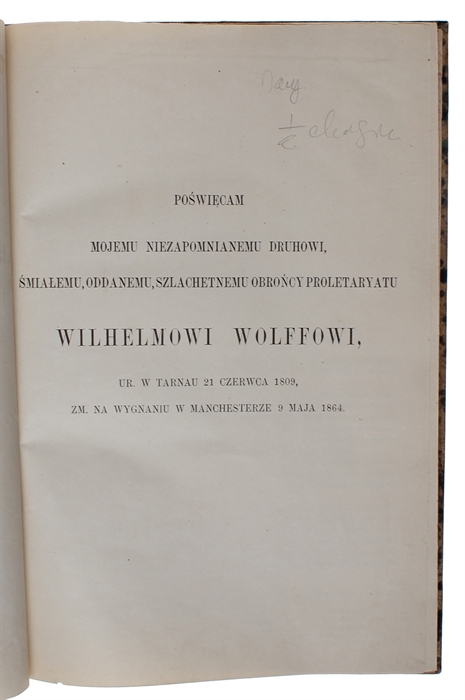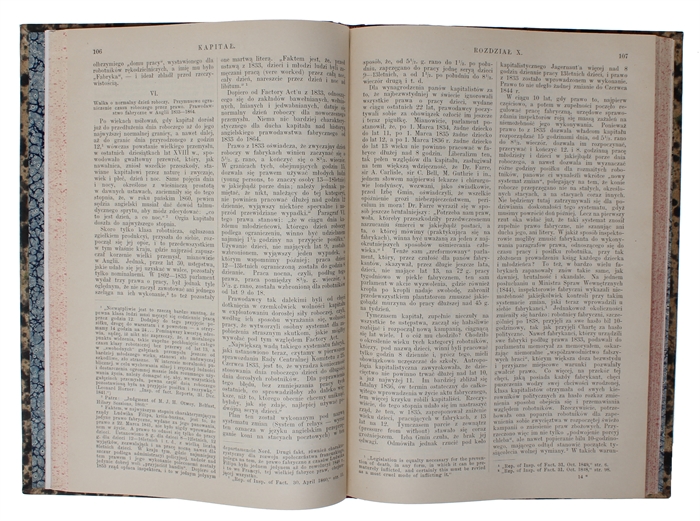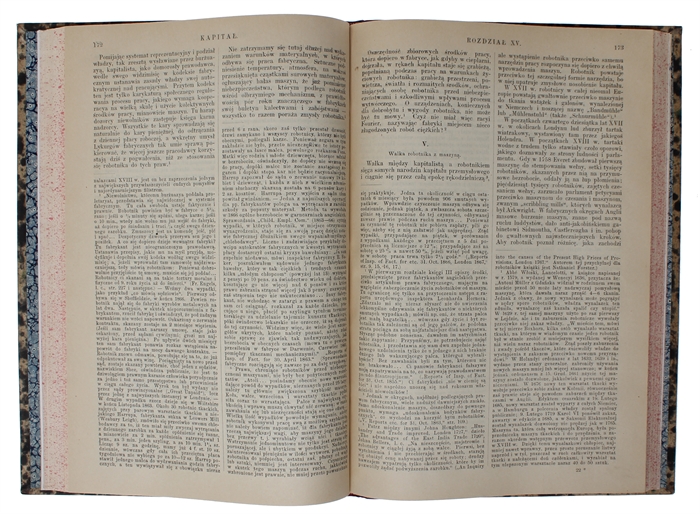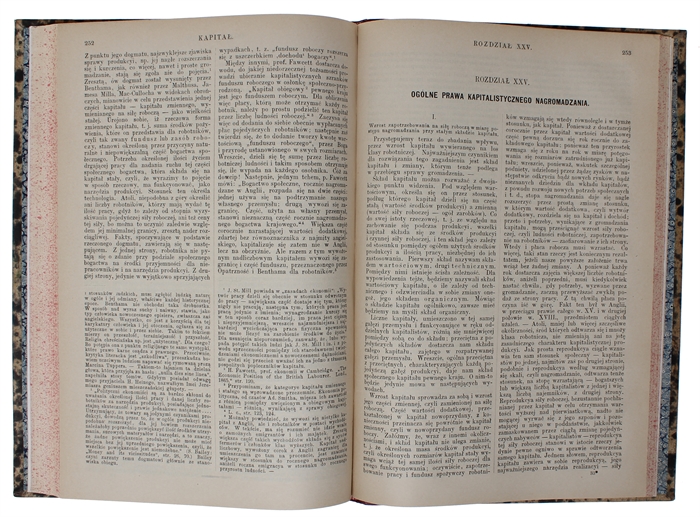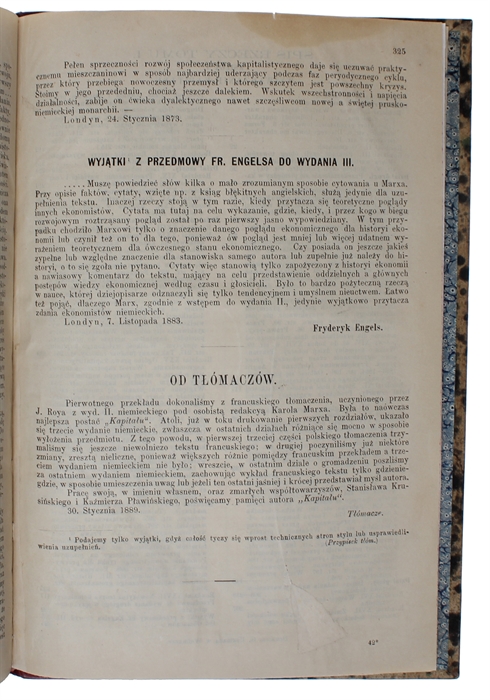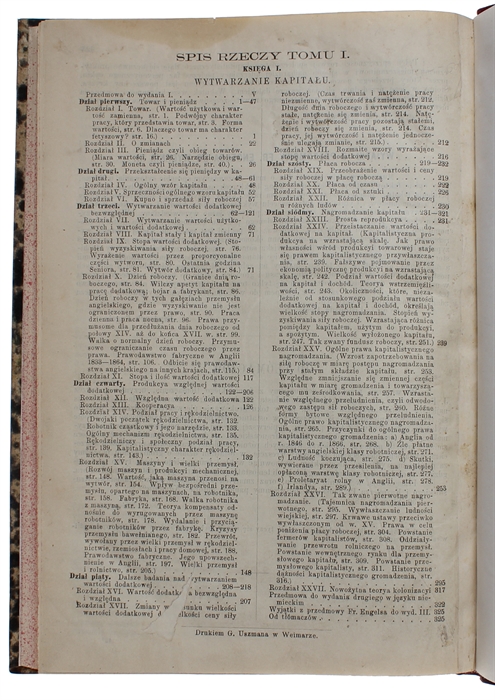FIRST POLISH EDITION OF THE BIBLE OF MARXISM
MARX, KAROL [KARL].
Kapital. Krytyka ekonomii politycznej. Tom Pierwszy. Ksiega I. Wytwarzanie kapitalu.
[Weimar, Gustaf Uszman] for E.L. Kasprowicz, Lipsk [Leipzig], 1884-[89].
Large 4to. Bound in a very nice recent red half calf with five raised bands and gilt title to spine. Title-page with repair to inner margin and with a few closed tears. Outer margin discreetly reinforced. Verso of title-page with "1942 D. 1513" in pencil. Last leaf also with a couple of closed/repaired tears, with minor loss of text, and reinforced in margin. Apart from the nicely restored flaws to the first and last leaf, this is an excellent, very nice and clean copy. VII, 325, (1) pp.
Very rare first edition of the first Polish translation of Marx' revolutionizing main work, "The Capital", which was clandestinely printed in Germany and then smuggled into Poland.
The Polish translation, which is much rarer than the first Russian edition, and thus of the utmost scarcity, was illegally printed in Germany, with the mediation of the translator Kasprowicz (who worked for Brockhaus), by G. Uszman in Weimar (far enough from Prussia for the government not to be too concerned with the socialist activities of Polish students) and was then smuggled, mostly via Leipzig and Torún, into Russian Poland. It appeared in three parts, from 1884 to 1889.
The translation, which was mainly done from the French, was the work of the hugely influential Polish socialist group, the Krusinsk-ites, which counted Stanislaw Krusinski, Ludwik Krzywicki (who corresponded directly with Marx himself), Mieczyslaw Brzezinski, Kazimierz Plawinski, and Jozef Siemaszko.
Ludwik Krzywicki (1859-1941) was the editor-in-chief of this great collaborative work. He is credited with being the leading Marxist of the period and one of the greatest Marxist thinkers of Poland. In 1883 he was expelled from Warsaw University, after which he went to Germany, Switzerland and France, before returning to Poland in 1893, where he continued his political activities and took part in the 1905 revolution. While in Leipzig (from 1883), working on the translation of the Capital into Polish, he began corresponding with Marx, and after Marx died (March 1883), he continued corresponding with Engels, who provided direct suggestions of improvements and corrections.
The publication of the first Polish translation of Marx' Capital not only came to influence Polish politics and economics, it also marked an important divide in Polish socialism and constitutes one of the earliest printings within organized Polish Marxism.
"In 1882 Ludwig Warýnsk (1856-89) organized in the former Congress Kingdom the first Polish workers' party under the name Social-Revolutionary Party "Proletariat". At the same time in the Russianized Imperial University of Warsaw a circle of young Polish socialists established itself. Its main theoretician was Stanislaw Krusinski (1857-86) after whom the group were called "Krusinski-ites". The most important among them was later to become one of the greatest scholars in the field of the social sciences. In 1884 the Krusinski-ites published in Leipzig the Polish translation of volume one of "Capital".
In the ideology of the first Polish Marxists two different tendencies are to be distinguished; a social-revolutionary and a social-democratic one. The first was prevalent in Warzynski's "Proletariat"; after the secession of a social-democratic group named "Solidarity" and led by Kazimierz Puchewicz it was unanimously accepted by this party. The second tendency was dominant in Krusinski's circle. The differences dividing them were profoundly theoretical and not merely tactical. Generally speaking, the social revolutionaries emphasized the important role of the "subjective factor" in history while the social democrats insisted on the necessity of a gradual "ripening" of the economic conditions of the socialist revolution. The social revolutionaries closely collaborated with the Russian populist party, The People's Will, and, under its influence, endorsed political terrorism; the social democrats were resolutely opposed to this. Even more important was the controversy concerning the basic theoretical assumptions of Marxism and their applicability to an economically backward country. The social democrats were convinced that the objective conditions for a socialist revolution would not be ripe until the given country had passed through all phases of capitalist development..." (Walicki, Stanislaw Brzozowski and the Polish Beginnings of "Western Marxism", pp. 41-42).
Order-nr.: 60267


